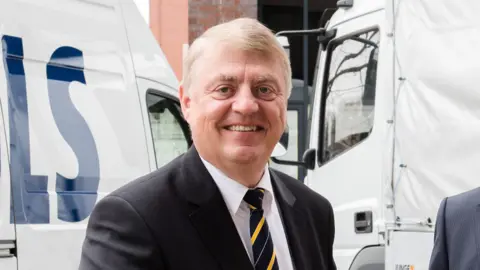Royal Mail: Can new boss Simon Thompson turn it around?
 Royal Mail
Royal Mail Simon Thompson, a former Ocado executive who also ran the NHS Test and Trace app, has been named as Royal Mail's new UK boss.
But he faces a tough job reinvigorating the postal service whose last permanent chief executive, Rico Back, quit unexpectedly in May.
Royal Mail has struggled to cope with a surge in parcel deliveries during the pandemic which caused delays over Christmas.
The volume of letters it delivers has also continued to fall as people rely more on email and text.
The firm has admitted "failing to adapt" to the new reality and "holding on to outdated working practices and a delivery structure that no longer meets customer needs".
The hope is that Mr Thompson, who has held customer-service oriented roles at HSBC and Lastminute.com, can bring the service into the 21st Century as it faces fierce competition from within the parcel delivery market.
"Adapting with flexibility is not Royal Mail's strongest point, and it will need to be much more nimble to keep abreast of its customers changing needs and stay in with a chance of keeping up with the competition," said Susannah Streeter, an analyst at stockbrokers Hargreaves Lansdown.
What has gone wrong at Royal Mail?
Mr Thompson's appointment comes after a tough year for Royal Mail, which last month agreed a pay deal with the Communication Workers Union (CWU), ending a two-year dispute.
For the past eight months the company has been run by interim chief executive Stuart Simpson, who took over when Mr Back stepped down after less than two years in the job. Mr Back had faced criticism over his pay and was reportedly running the business from his home in Switzerland at the time of his departure.
The service's problems are deeper rooted, however, with sales having fallen in every year but one since it was privatised in 2014.
 AFP
AFPMs Streeter said it had underinvested in new technology for years, leaving it "playing catch up" with the competition, despite its dominant position as the UK's universal postal provider.
Its Universal Service Obligation - to provide a postal service to all parts of the UK at flat rates - is another burden not faced by its rivals.
"With the decline in letter writing accelerating, Royal Mail needs to better capitalise on the online shopping boom, but it struggled desperately over the festive period to keep up with the huge demand on its service," said Ms Streeter.
"That is likely to have pushed some of its traditional customers into the arms of its rivals, with the likes of Hermes which uses self-employed couriers, proving a tough competitor in terms of price."
Can Mr Thompson fix things?
According to Dr Paul Simmonds of Warwick Business School, Mr Thompson's experience working for customer-focused businesses such as Apple, Honda and Ocado will be a "strength". He also has some knowledge of Royal Mail having been a non-executive director since 2017.
"Top of his 'in tray' is the need to reinvigorate the group's efforts to transform itself," Dr Simmonds said.
Part of this will involve striking further agreements with the CWU on pay and conditions so it can bring in more efficient work practices, something that will take skill and diplomacy, he said.
"Of equal importance is the question of what to do with the letters business which is in terminal decline."
 Alamy
AlamyIt is not all bad news for the business as its international arm, run by Martin Seidenberg, has been performing well.
But on Monday, Royal Mail's interim chairman Keith Williams said the firm was in a period of "significant transition" and needed to "move quickly" to improve its services.
Mr Thompson said it had been a "challenging year" for Royal Mail, adding: "Looking ahead, we need to build on the great trust we have on the doorstep. We need to develop a razor-sharp focus on the customer."
Mr Thompson will be paid about 20% less than Mr Back, with a base salary of £525,000 and a pension allowance of 13.6%.
He will also be eligible to participate in the firm's short-term and long-term incentive plans, taking his total annual remuneration to around £1.4m.
Mr Back took home £1.7m last year and received a £5.8m payout on joining the firm despite shareholder objections.
